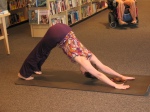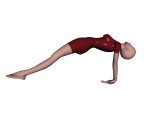Getting lost is a disconcerting sensation. For many goal-oriented people, being lost means something, somewhere broke down along the lines of their motto, “I cannot cope with the worst case scenario, so I will over-plan to be prepared if the worst happens.” While making a plan, then working that plan is a valid approach to achieving success, the best of us get lost. Coping with the reality might be easier if we practice meditation because the feeling of being lost in our own minds and bodies but not experiencing panic is possible. Then it’s a matter of transferring that lesson to real life situations.
The key is surrender. The first few minutes of sitting in meditation are normally a challenge almost every time we go to the cushion. That’s because we are so used to holding on to things. It’s a natural sensation to want to hold on. In my opinion, everyone is born with the desire to hold on because our bodies are constantly pulled on by gravity. It makes sense to me to hold on to things, people, and myself simply because it’s how we function in relationship to the earth’s pull on our beings. Surrendering to this awareness of being held onto by gravity is a first step when sitting in meditation.
Up to the first ten minutes of meditation practice is basically about noticing gravity’s hold over our bodies, organs, and senses. Simply notice, then intentionally start at the source of the pull and work upwards through the body to relax or let go of the worry about being pulled down all the time. It’s very normal to feel everything settling downward (some people note this as being “grounded”), and it’s at this point of everything being settled down we try to surrender it all to a feeling of weightlessness. We let go of the worry. Surrender to gravity’s pull then allow the anxiety about whether or not it’s working to surface and face it. At this point it’s possible to get lost in the lightness of being and just breathe until the session is ended.
It’s surrendering to the power of being lost and letting go of expectations that we practice on the cushion then try to recall when we get lost on the highway or in a tricky plot pattern we’re writing. In meditation we keep breathing and follow the breath to the end. In real life, we should apply the breath to keep us calm and working toward correcting the wrong turn or the wrong speech or the wrong choice. Everyone gets lost. It’s easier for some than others to deal with being off-track. A few moments of being lost in your own mind everyday and surfacing to a better place in the end is one possible way to learn how to deal with the real world situation of losing your way no matter how much you plan in advance.
All the outlines, maps, and global positioning devices in the world cannot teach us how to cope. Those are tools for dealing with and correcting the problem. Applying lessons learned on the meditation cushion to daily realities is one method of coping with being lost along the journey. It happens to everyone occasionally. For those goal-oriented folks like me, the key is adding “get lost” to the plan.
There are five primary areas of practice to the Writer Wellness plan. Every other week I will post an idea for relaxation (Monday Meditation,) creative play (Tuesday Tickle,) fitness and exercise (Wednesday Workout,) journaling and misc. (Thursday Thought,) and nutrition (Friday Feast.)
 Meanwhile, remember to look for a digital or print copy of Writer Wellness, A Writer’s Path to Health and Creativity at Who Dares Wins Publishing, http://whodareswinspublishing.com.
Meanwhile, remember to look for a digital or print copy of Writer Wellness, A Writer’s Path to Health and Creativity at Who Dares Wins Publishing, http://whodareswinspublishing.com.
And check out these great blogs for ideas to keep your writing and publishing healthy and prosperous.
http://writeitforward.wordpress.com/ Bob Mayer
http://jenniholbrooktalty.wordpress.com/ Jenni Holbrook
http://warriorwriters.wordpress.com/ Kristen Lamb
http://inspiration4writers.blogspot.com/ Inspiration for Writers, Inc.
http://pentopublish.blogspot.com/ Natalie Markey
http://amyshojai.com Amy Shojai
Check out my new website Joy E. Held
Have you subscribed to this Writer Wellness blog yet? Get email updates when a new post is added. Click “subscribe” and leave your email. That’s it and thanks in advance!
Be well, write well

 Just in case you aren’t following the fabulous social media expert for writers
Just in case you aren’t following the fabulous social media expert for writers 

 For more information, read Spark, The Revolutionary New Science of Exercise and the Brain by
For more information, read Spark, The Revolutionary New Science of Exercise and the Brain by 



